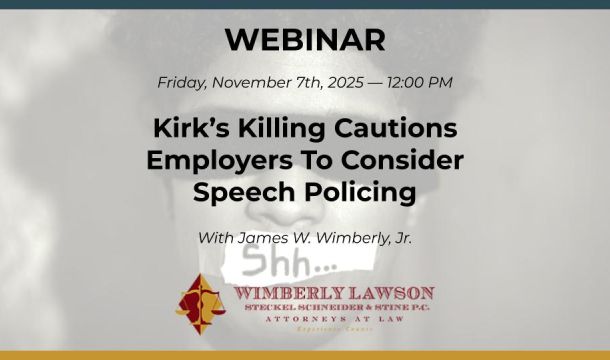STRATEGIC RESPONSE PLAN TO AMBUSH UNION ELECTIONS
Since the effect of the new National Labor Relations Board (NLRB) "quickie" election rules is to deprive an employer of valuable time to address issues, it is critical for employers to do pre-planning steps to take in advance of union organizing, as well as steps to take at the onset of union organizing. Failure to take such steps could result in a situation where an employer faces a union election in less than three weeks after finding about the advent of union organizing activities. Statistics indicate that an employer has little chance of changing employees’ minds in such a short period of time, particularly where unions normally do not request an election unless they have signed cards from a majority of voters. Further, pre-election NLRB procedures are done so quickly that an employer may be forced to spend much of the available time dealing with those issues rather than addressing issues of whether the workers are better off with or without a union. Since the new "ambush" election rules go into effect on April 14, 2015, this article briefly summarizes some of the most important suggested steps.
Steps Prior to Advent of Union Organizing: Certain steps are desirable if not necessary to take prior to the advent of any type of union organizing. Every employer desiring to maintain union-free status should have a policy statement as to why it feels that a union is not in the best interest of the employees or the company. Such a policy statement should be written into the employee handbook and published as part of regular company communications.
It is also important that some sort of policy explanation towards unions be given in the orientation procedure for new hires. It has been shown that new hires receiving this information are more supportive of the company’s position on unions and more likely to tell the employer when union organizers come around. Many applicants will make a non-binding "commitment" after hearing such policy statements, and make the company’s union campaigning in the event of union organizing more effective.
Third, company management and supervision needs to be trained on the company’s union-free policy, and on the critical necessity of reporting any suggestions that union organizing may have commenced at the employer’s establishment or in the employer’s geographic area. Experience has shown that oftentimes supervisors do not report such matters, in part because they have never been trained on the importance of doing so. Such a failure to communicate creates a disastrous situation where the employer has little time to plan or respond.
Finally, there is a fourth critical component at this pre-union activity stage that every employer should have in place some type of internal complaint procedure to resolve employee complaints, that do not require employees to go outside the company, either to a union or to a government agency. One of the strongest appeals of a union is having a grievance procedure in which employees have the right to address their concerns. Any steps taken by an employer to correct grievances after the advent of union organizing will be seen as lacking credibility, and possibly illegal by the NLRB.
While many other items might be mentioned as part of the pre-union activity planning stage, the above four points should be considered as minimums.
Steps to Take After Commencement of Union Organizing: When an employer becomes aware of union organizing activities at his facility or nearby, the first steps should be to contact a responsible labor attorney who specializes in this practice. A great deal of planning and strategy is necessary, and what seems logical may not be legally or strategically appropriate.
A labor attorney will likely want to visit the facility and meet with upper management, and possibly all levels of supervision. The initial purpose in the visit will likely be fact-gathering. It becomes important to immediately know which union is involved, the extent of the union organizing activities, the potential issues, and the history and capability of the company in dealing with human resource issues. Some of these facts can be gathered in group meetings of management and possibly supervision, but sometimes "one-on-ones" with individual supervisors are helpful if not necessary. At a minimum, upper management needs to be educated on the does and don’ts of union campaigns, such as the "TIPS" rule (no threats, interrogation, promises or spying). Initial evaluations will need to be made of whether there are any human resource issues that can or should be addressed, whether the company should come out in its own "anti-union card signing" campaign or the like, the determination of an appropriate company spokesperson(s), an initial evaluation of eligible voters and who is a "supervisor," and related matters.
Only after gaining this type information from an experienced expert can an employer properly plan what to do next. In some cases, the employer will use a "wait and see" approach, in which all management and supervisors are advised to be on alert and report any and all suspicious activities to a central source. Even in such situations, however, managers and supervisors need to be well versed in the "does and don’ts" of legal and illegal statements, and trained how to respond in casual discussions with employees when the subject of unions comes up.
In other cases, it may be decided that some type of union-free campaign response is necessary or desirable on the part of the employer. Such a response is particularly necessary if there is reason to believe that significant numbers of employees are signing union cards. Probably the simplest response is to post a notice reminding employees of the company’s position on unions, and/or the dangers of signing a union card. Sometimes managers or supervisors are trained to go around an ask each employee whether they have seen the notice, and/or whether they have any questions about it, thus generating useful discussions.
More aggressive responses include "one-on-ones" by supervisors with individual employees, and group meetings conducted by higher management. Handouts can also be used and there are some excellent videos available on the dangers of signing a union card. Even more aggressive responses include a campaign to promote the revocation of union cards already signed, or to encourage employees to fight the union themselves.
Some of the basic information or plans an employer needs to have immediately available are the following:
- Solicitation and Distribution Rule
- What if Approached by Union Official
- What if You Hear Rumor of Union Activity in Plant or Community
- What if Subject of Union Comes Up in Your Presence
- What if Union Handbills the Plant
- Arguments Against Signing a Union Card
- Commit You to Union Membership Without Knowing Disadvantages
- May Require You to Pay Union Dues, Etc.
- May be Used as Basis for Calling Recognition Strike
- Is a Legal Document
- They Will Say Anything to Get You to Sign
- Cards Are Not Kept Confidential
- Like Signing a Blank Check
If you have questions on developing or implementing any of these plans, please feel free to contact your attorney at Wimberly & Lawson.
Related Content
Get Email Updates
Recent Content

Update of Work Authorization Immigration Status as of October 8, 2025

Workplace Investigations Largely Shut down, but Courts Remain Open during Shutdown for Now

Kirk’s Killing Cautions Employers To Consider Speech Policing

Trump Nominates Appointments to NLRB and EEOC but Policy Changes Likely to Be Delayed

DOL Launches Self-Audit Programs Designed to Help Employers Improve Compliance
